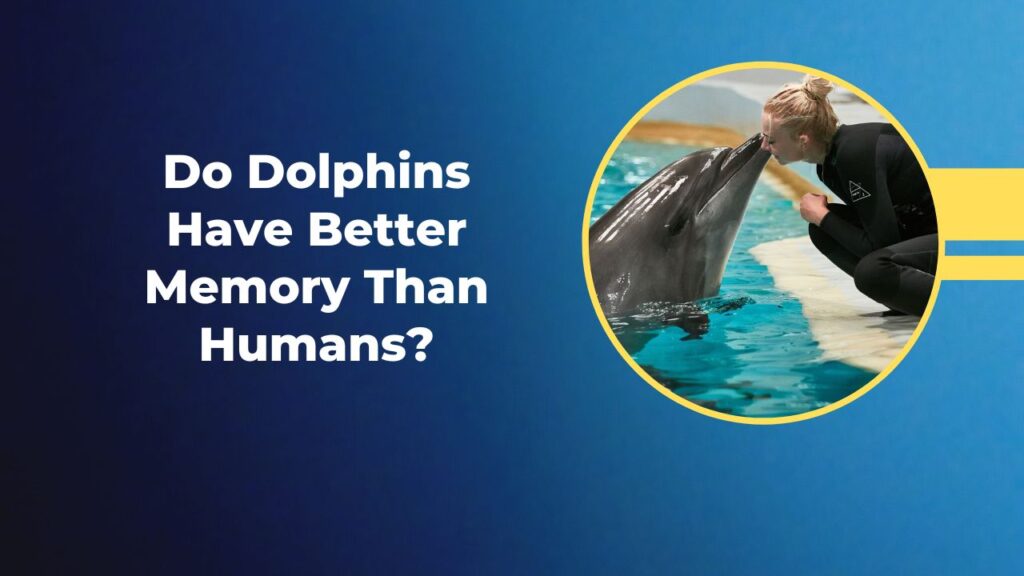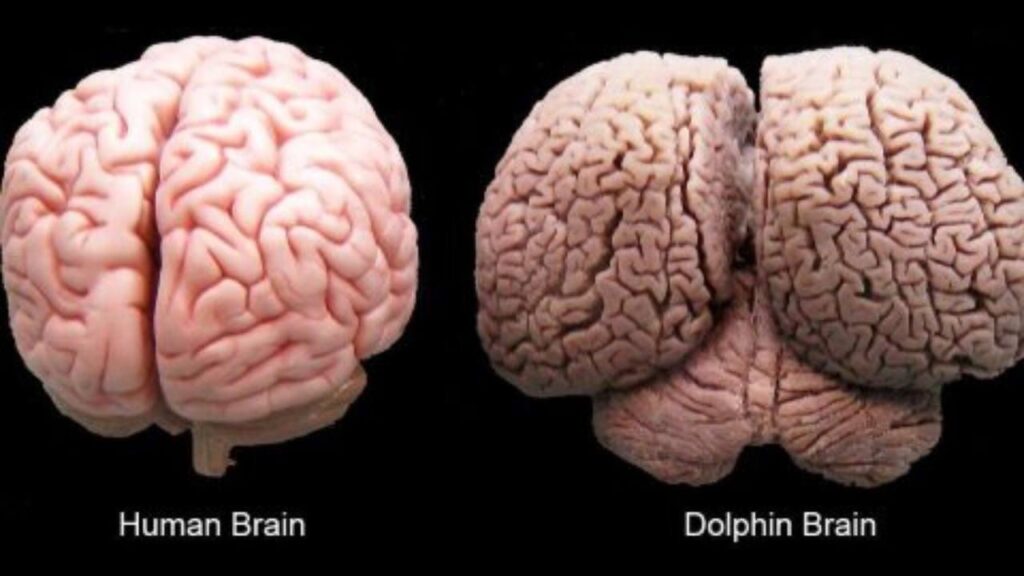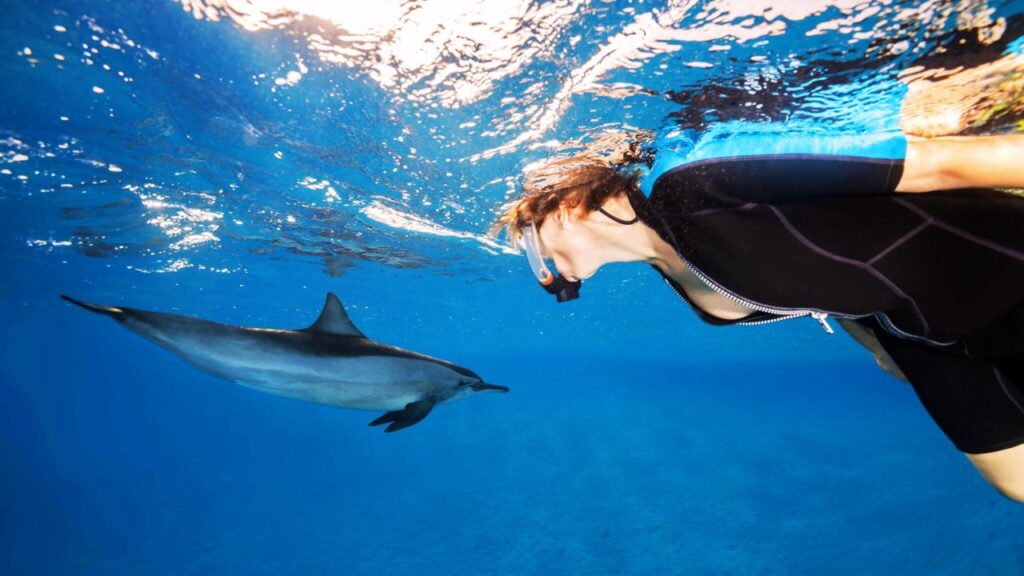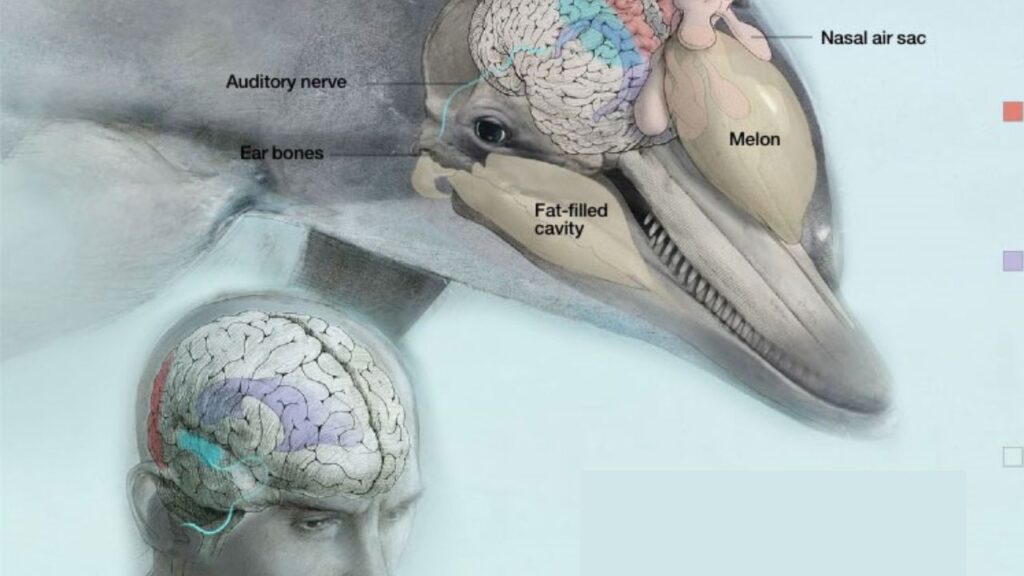Last updated on July 1st, 2024 at 12:13 pm

Do Dolphins Have Better Memory Than Humans? Dolphins have exceptional long-term memory; they can remember some people for more than 20 years, which may indicate that they have better memory than humans in some areas.
Dolphins are among the few animals in the vast animal kingdom that pique people’s curiosity the most. Dolphins have long piqued the interest of scientists and fans alike due to their intellect and gregarious nature.
Their remarkable memory is one facet of their cognitive prowess that keeps experts intrigued. This article delves into the depths of dolphin memory, examining its consequences and drawing comparisons with human memory.
Table of Contents
Understanding Dolphin Memory
Dolphins have an amazing ability for long-term memory, making them one of the most intellectual animals in the animal kingdom.
Their astounding capacity to retain particular people, noises, and acquired tasks for protracted periods of time has been documented by research; some studies have even suggested retention lengths of up to 20 years or longer.
With dolphin societies’ complex social dynamics and flexible group formations, this cognitive ability is especially astounding.
Dolphin memory’s function in social interactions is among its most fascinating features. Dolphins establish complex social networks with close relationships with other members of their own species.
People within these networks form their own hierarchies and relationships, depending on memory to identify and keep in touch with known friends throughout time.
For instance, research has demonstrated that even after years apart, bottlenose dolphins are still able to recognize the distinctive whistles, or “signature whistles,” of other dolphins they have come across. Within dolphin populations, this capacity promotes social bonding and makes reunions easier.
Moreover, dolphin memory encompasses environmental awareness and foraging techniques in addition to social interactions. [Do Dolphins Have Better Memory Than Humans?]
Dolphins live in dynamic marine habitats with fluctuating prey distributions, ocean currents, and possible dangers.
Dolphins use their memories to recall safe havens, migration paths, and productive hunting grounds in order to successfully navigate these intricate ecosystems.
Dolphins in difficult aquatic conditions maximize their chances of survival and successful reproduction by making use of their long-term memory.

Comparing Dolphin and Human Memory
Although dolphins have remarkable long-term memory, it is difficult to directly compare dolphin memory to human memory.
Humans’ ability to learn, solve problems, and communicate is supported by a complex interplay between their long-term and short-term memory systems.
Humans have the capacity to temporarily store and alter information in short-term memory, also known as working memory. This ability helps people make decisions and carry out tasks quickly.
Dolphins, on the other hand, might give priority to long-term memory for certain cognitive activities that are appropriate for their social structure and ecological niche.
Dolphins are better at tasks requiring sustained memory recall over prolonged periods of time than humans are at processing information quickly and retaining short-term memory.
This difference is a reflection of the different evolutionary pathways and environmental influences that have shaped human and dolphin cognitive capacities.
Moreover, there are significant distinctions between the brain systems in humans and dolphins that underlie memory. [Do Dolphins Have Better Memory Than Humans?]
The hippocampus, prefrontal cortex, and temporal lobes are just a few of the intricate brain regions that work together to encode, integrate, and recall information to support human memory.
On the other hand, dolphin memory most likely depends on brain structures that are peculiar to aquatic circumstances, though the neural foundations are still being studied.
| Aspect | Humans | Dolphins |
|---|---|---|
| Memory Systems | Both long-term and short-term memory | Primarily long-term memory |
| Cognitive Functions | Learning, problem-solving, communication | Social cohesion, navigation, prey acquisition |
| Neural Mechanisms | Complex brain regions interact to encode, consolidate, and retrieve information | Specialized brain structures adapted to aquatic environments |
| Cognitive Flexibility | Humans excel in rapid information processing and short-term memory retention | Dolphins excel in sustained memory retrieval over extended periods |
See Also: Do Dolphins Remember Humans? In the Depths of Memory

Factors Influencing Memory
Brain Structure and Function
When considering brain size in relation to body size, humans have larger and more sophisticated brains than dolphins. [Do Dolphins Have Better Memory Than Humans?]
Given that complex neuronal networks involved in memory acquisition, consolidation, and retrieval are supported by the human brain, this anatomical variation probably affects memory capacities.
Dolphins, on the other hand, may devote less energy to memory-related functions even if their brains are highly developed and show specific adaptations for aquatic life, such as expanded auditory areas for echolocation.
Gaining knowledge of these distinctions in neuroanatomy can help one better understand how memory has evolved throughout animal evolution.
Ecological Niche and Social Behavior
Based on their social behavior and ecological niche, dolphins and humans are subjected to quite different cognitive demands.
Because they live in such a variety of terrestrial habitats with intricate social structures, language-based communication, and tool use, humans require highly developed cognitive skills, including memory.
Dolphins, on the other hand, live in dynamic aquatic environments where feeding techniques, social relationships, and spatial navigation are critical.
Dolphins’ preference for memory in relation to social cohesiveness, navigation, and acquiring prey is a reflection of the selection factors that have shaped their cognitive evolution.
Diet and Nutrition
Memory function may be impacted by dietary differences between humans and dolphins. Human diets often include a wide range of foods high in nutrients that are vital for the health of the brain, like the omega-3 fatty acids found in fish.
These nutrients help with memory and other aspects of cognitive function. Dolphins, on the other hand, mostly eat fish and other marine life, which may also include vital nutrients for the health of the brain.
On the other hand, dietary composition and availability differences may have distinct effects on memory-related processes in humans vs dolphins. [Do Dolphins Have Better Memory Than Humans?]
Environmental Stimuli
Memory processes can be influenced by the kinds and magnitude of environmental stimuli that both humans and dolphins experience.
In terrestrial habitats, humans are exposed to a wide range of sensory inputs, including as tactile, olfactory, visual, and aural stimuli.
Exposure to various environmental stimuli, including social interactions, cultural artifacts, and landscapes, affects both the encoding and retrieval of memories. In aquatic habitats, dolphins mostly receive sensory inputs through auditory and echolocation signals.
Dolphin interactions with prey and conspecifics, as well as underwater geography, may all have an impact on memory development.
See Also: Do Dolphins Know What Humans Are? Deciphering Dolphin Perception

Implications for Research and Conservation
Enhancing Understanding of Animal Cognition
Researching dolphin memory helps us better understand how animals think and remember things. [Do Dolphins Have Better Memory Than Humans?]
Researchers can learn more about the cognitive processes behind complex behaviors and social dynamics in non-human animals by examining how dolphins recall their environment, interactions, and social relationships.
By illuminating the variety of cognitive techniques used by other animals to adapt to their circumstances, this understanding advances the subject of comparative cognition.
Informing Conservation Strategies
Understanding dolphin memory can be useful for conservation initiatives that safeguard marine animal populations and their environments.
The creation of mitigation techniques to address concerns including habitat loss, pollution, and human disturbance, as well as habitat management strategies and conservation planning, can be informed by an understanding of how dolphins encode and retrieve information about their environment.
Researchers and conservationists can seek to protect these intelligent marine animals and their surroundings for future generations by incorporating the understanding of dolphin memory into conservation programs.

Future Directions
There is room for further investigation of dolphin memory as technology and research techniques develop. [Do Dolphins Have Better Memory Than Humans?]
Subsequent investigations may focus on clarifying the complex brain pathways that support dolphin memory functions, providing an understanding of the underlying anatomical structures and physiological mechanisms.
Moreover, studies could explore the complex relationship between memory and communication in dolphin communities, revealing the ways in which memory affects vocalizations, cooperative behaviors, and social dynamics.
Furthermore, by analyzing how environmental factors like habitat quality, prey availability, and human disturbances affect dolphin memory recall, scientists might learn more about how these sentient marine mammals adapt to shifting ecological situations.
These new avenues could contribute to conservation efforts, deepen our study of dolphin cognition and memory, and increase public awareness of these amazing animals.
FAQs: Do Dolphins Have Better Memory Than Humans?
Are Dolphins More Intelligent Than Humans?
Humans and dolphins both have distinct intelligences that are well-adapted to their surroundings. Humans are highly skilled in abstract thought and technological innovation, while dolphins are superior in social cooperation and problem-solving.
Do Dolphins Or Humans Have Better Memory?
It is difficult to compare human memory to that of dolphins since humans have highly developed memory systems that serve a variety of cognitive processes, whereas dolphins have remarkable long-term memory for social interactions and environmental navigation.
Which Animal Has Better Memory Than Humans?
The strengths of memory range among species and situations; for example, birds, octopuses, and some rodents have exceptional memory in one area, but dolphins, elephants, and some primates are excellent in long-term memory and social cognition.
Conclusion: Do Dolphins Have Better Memory Than Humans?
Dolphin memory stands as a tribute to the complexity of animal cognition within the enormous fabric of the natural environment.
Even if their memory may not be exactly the same as ours, these incredible creatures’ capacities highlight how important it is to learn more about and appreciate these intelligent marine mammals.
We will learn more about the inner workings of dolphin cognition and strengthen our ties to the maritime ecosystems they live in by solving the puzzles surrounding their memory.
In order to ensure a better future for dolphins and people alike, it is our duty as stewards of the earth to protect these amazing animals and the environments they call home.

Mr. Das, a certified pharmaceutical scientist, holds a Bachelor of Science in Pharmaceutical Sciences and passionately contributes to dolphin conservation as a member of the committee in Bangladesh.


